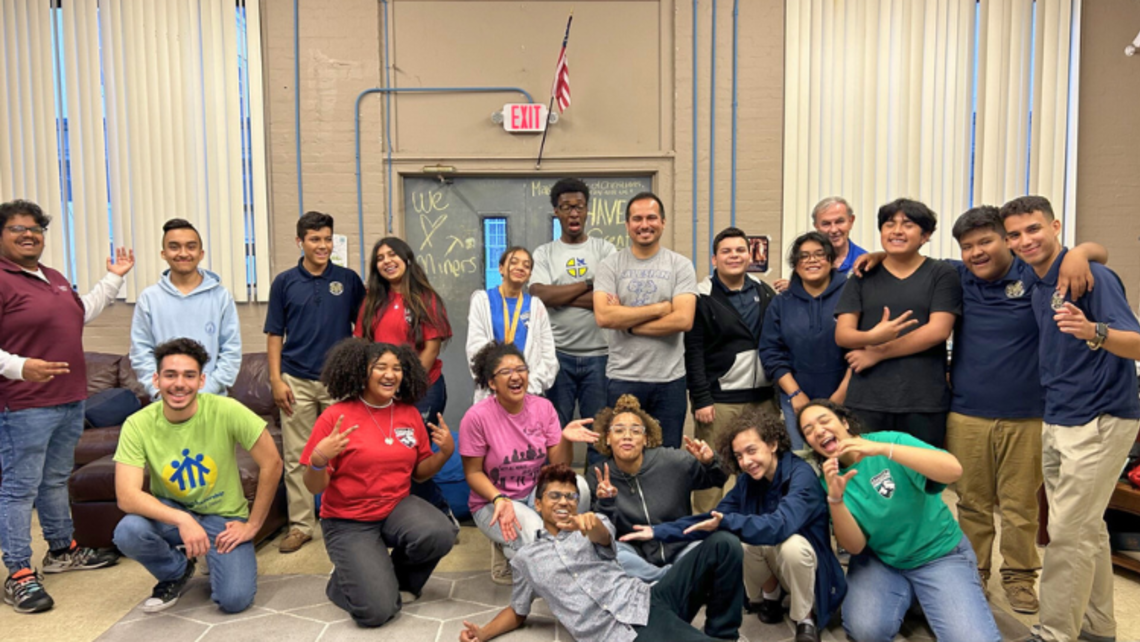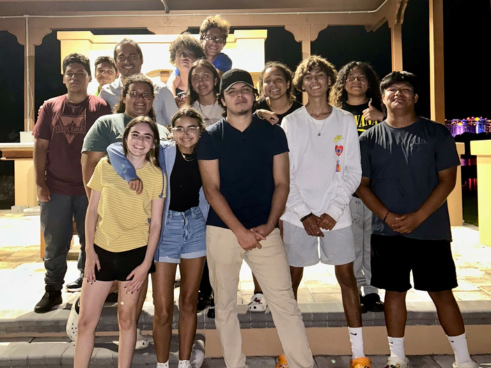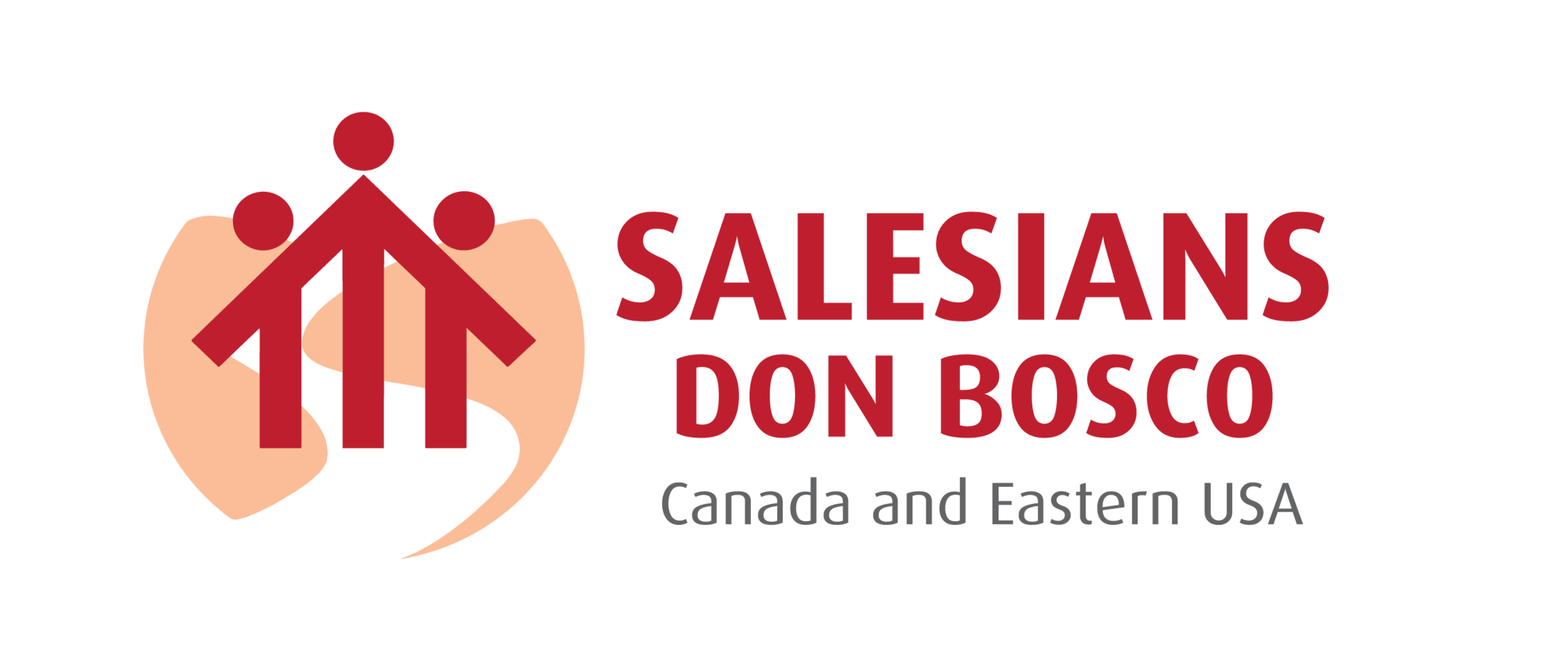

Photo by Fr. Eddie Chincha, SDB
By Fr. Eddie Chincha, SDB
(Tampa, FL – January 10) – Most of us might be used to seeing ministry as something organic, spontaneous, and people-oriented. While this is a very good approach, we are being called by the Church and our congregation to be a listening Church that responds to the needs of the time. So, how can we grow in this direction? Well, here at Cristo Rey Tampa Salesian High School (CRT), we adopted a new method inspired by the school's academic approach. Teachers are, among other things, trained to use a data-driven approach to instruction. That is, to collect the results of different formative and summative assessments and measure the results of their instructions. So, if a quarter of the students fail their quiz, then the teacher will reflect on how the quiz matched the content of their lessons, which questions the students struggled with most, and what strategies will help students to overcome particular problems. Later on, the teacher will measure the student's performance by comparing results from one quiz to the next. This was the method all teachers were encouraged to use at the behest of Principal Matt Torano.
So, the youth ministry team decided to adopt a similar approach. Some might say that making ministry or education into something empirical might seem reductive because it turns people into numbers. I would like to argue that this is far from true. This approach is a strength of our Salesian ethos and our Preventive System, which begins with reason, includes religion, and is embedded in loving kindness. It is only by learning the situation that we are dealing with that we can discern what goal we plan to achieve with the time we have. Data collection and analysis also helps us not to make assumptions about certain people. Obviously, data collection without prayer and discernment is sterile. However, institutional decisions not guided by reliable data are often biased and wasteful. Moreover, data collection also helps us to know if we have achieved our goals.
Finally, many things can’t be quantified or expressed in a pie chart, such as spiritual growth, repentance from sin, etc. Some things will always be beyond measure. However, just because we can't measure those, doesn't mean we can't measure anything, though.
I would like to share some of our data and how they helped us in our ministry. I hope this convinces you to also adopt this approach.
These are some of the results that we collected in the 2020-2021 academic year:
Which religious tradition does your family belong to?
Catholic: 71%
Protestant: 21%
Other: 3%
None: 5%
Agnostic/Atheist: 0%
Which religious tradition do you personally identify with?
Catholic: 64%
Protestant: 16%
Other: 3%
None: 9%
Agnostic/Atheist: 8%
These results helped us to see that we have students who, though raised in a religious household, lost their faith somewhere along the way. There was a decrease from 71% to 64% of students who identified as Catholic and a decrease of 21% to 16% among Protestants. There was also an increase from 4% to 9% in the Nones and from 0% to 8% in Agnostics and Atheists. So we decided to pay attention to those students who struggled with their faith the most or said they had no religion. We heard their stories and their concerns. So, we decided to open an oratory on Fridays, start every day with schoolwide convocation in the morning, offer CCD lessons during lunchtime, reach out to students who were atheist, agnostic, or had non-religion, and revamp our theology curriculum to meet their intellectual needs. We made the campus ministry program into a structured program with mandatory and optional retreats, and we obtained cooperation with multiple school departments. Finally, we organized a very careful and objective selection of students who attended Province Leadership retreats and the Gospel Roads programs, so as to choose students who would effectively bring back to our school what they experienced at these programs. So, the results after 2 years are the following:
Which religious tradition does your family belong to?
Catholic: 63%
Protestant: 24%
Other: 4%
None: 8%
Agnostic/Atheist: 1%
Which religious tradition do you personally identify with?
Catholic: 60%
Protestant: 21%
Other: 3%
None: 11%
Agnostic/Atheist: 5%
So, we can see that during his academic year, there was a decrease from 63 to 60% in students who identify as Catholic and a decrease of 24 to 21% of those who identify as Protestant. The number of students with no religion also increased from 8 to 11% and atheist/agnostic from 1 to 5%. This is great news. We have fewer students who left their family's faith tradition compared to two years ago. Two years ago we dropped from 71 to 63% and this year it decreased only from 63 to 60%.
Furthermore, the number of students who identify as atheist or agnostic decreased from 8% two years ago to 5% this year. This is a 50% reduction in students abandoning their faith. As the reader can see, a huge gap has certainly been bridged.
We also collected other encouraging data this year:
When asked “I believe in the Real Presence of Christ in the Eucharist,” they responded:
Strongly Agree: 39%
Agree: 45%
Disagree: 14%
Strongly Disagree: 1%
Note that our CRT youth indicate an 84% agreement to believing in the Real Presence compared to the national average which says that only a third of Catholics believe in the Real Presence. We are happy to see these results.
My theology classes here at CRT help me grow in my faith.
Strongly Agree: 15%
Agree: 62%
Disagree: 17%
Strongly Disagree: 6%
Even when I sin, God still loves me.
Strongly Agree: 53%
Agree: 42%
Disagree: 5%
Strongly Disagree: 2%
I would like to learn how to get closer to God.
Strongly Agree: 57%
Agree: 35%
Disagree: 6%
Strongly Disagree: 2%
We also have more work ahead of us, as illustrated by how the students responded to the following:
Campus Ministry activities helped me grow in my faith.
Strongly Agree 19%
Agree 55%
Disagree 21%
Strongly Disagree 5%
Of the 26% of students who responded negatively, ___% were:
Freshmen: 22%
Sophomores: 34%
Juniors: 26%
Seniors: 15%
With this data in our hands, we can begin to respond to this situation with class retreats. One thing to keep in mind is that many of the students who responded negatively were given extra care. We received a lot of positive feedback, even from many of the mentioned students. We will continue to focus on these students so that they don’t feel left out. Don Bosco said, "It is not enough to love the young; they must know that they are loved." So, our next task is to ensure that the 26% of students who responded negatively know we are doing everything possible to spiritually accompany them, too. We hope to collect more data at the end of the year and evaluate our methods again.
While these stats may look nice, we might ask ourselves, "So what if there are fewer nones or agnostics or atheists?" It’s all about da mihi animas, and making them “good Christians and honest citizens.” If we are not saving souls, then what are we doing? We have these young people for four years of their lives to give them the most we can so they can face a world that will challenge them in all sorts of ways. We are happy to equip them to face those challenges by strengthening their faith. We shouldn’t want our graduates to say that high school was the best time of their lives. Instead, we should want them to say they are having the best time of their lives now, in the present moment, because of what we gave them in high school.
We feel very blessed with the results we have achieved here in Tampa. First, we owe everything to God’s providence. We have responded to His graces by implementing a strong SEPP and close cooperation between the Salesian community under Fr. Franco Pinto, SDB, and CRT's staff. We have a long day of class, from 7:30 a.m. through 4:00 p.m., and afterschool activities until 6:30 p.m. Both these long hours of work and your prayers have helped us to bring Valdocco here. Soon, I would like to share how the ministry has also impacted vocational animation.






